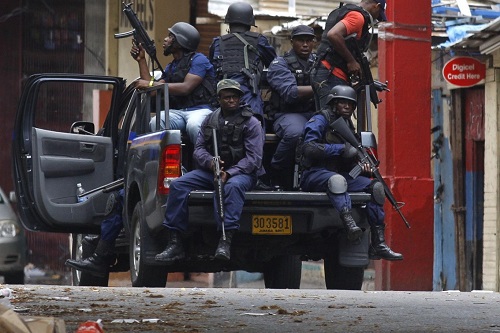Reuters photo
By
Ricardo Swire
As high crime rates and violence plague Latin America and the Caribbean this dual societal blight is extremely serious in Jamaica. The Island’s criminal posses have exerted national influence for many years, originally empowered by Jamaica’s two rival political parties to secure votes. The 2010 arrest and extradition to the USA of Jamaican kingpin “Dudus” Coke, his relationship with a former political party leader and Prime Minister (PM), was the defining moment that spotlighted underworld and elite demographic links.
Recent statistics show the Land of Wood and Water sprinting to a seven year peak in murder numbers. In June 2017 country Communities recorded thirty-three residents killed in one week. Jamaica’s 2017 murder rate represents a more than twenty percent increase over 2016, twenty-one residents killed in the capital Kingston’s “Corporate Area.” Intelligence data reflects the six hundred and thirty-nine residents, murdered between January 2017 and Saturday June 10, 2017, are signs of Jamaica’s restructuring underworld. Jamaica Constabulary Force (JCF) confirmed an averaged four killings daily.
The Island’s 2015 numbers reversed JCF’s 2014 actual progress in recording the lowest amount of murders after a ten year period. 2017’s killings have surpassed 2016 which outdid 2015. The depth of internal security crisis is self-evident. Jamaica’s July 19, 2017 “Zone of Special Operation (ZOSO) Act introduction gave the PM full authority to authorize more operational “bite” for internal security elements. The ZOSO Act allows both Jamaica Defence Force (JDF) and Jamaica Constabulary Force personnel to conduct special law enforcement operations in designated crime hotspots. Such internal security cordons should not exceed twenty-four hours.
The ZOSO Act also adds muscle to the JCF 2015 initiated “Get the Guns” campaign. This new legislation notes the joint internal security force “may search any place, vehicle or person within a Zone, without a warrant, if there is suspicion that a crime has been or may be committed.” Internal security agents, conducting operations in designated zones, must wear body cameras and register all weapons with the National Security Ministry. Jamaica’s internal security sector comprises police, military and private security companies.
The trio use Geospatial Technologies (GTs) and Geographic Information Systems (GIS) software to strategize and fight criminal threats. GIS crime scene maps are routinely interwoven in internal security and law enforcement operational planning and investigations. Select JDF soldiers use GTs for intelligence collection, operational planning and training exercises. Private security companies sell clients Global Positioning Systems (GPS) tracking devices as a service offering. The ZOSO Act moves Jamaica’s collective internal security response to more forceful tactics, JDF soldiers with a greater role in street and community patrols.
Jamaica’s internal security GTs software applications are integral in interrupting the Posses’ technological advancement. Today local gangs have evolved to include infamous “lottery scammers.” St James, Westmoreland and north-western parish Hanover, not far from Kingston, registered peaks in violence. Reverberations of rival online scammers, physically battling for access to electronic extortion schemes. On June 12, 2017 a Hanover family of four, including two children, were brutally shot dead in their home with high-calibre firearms. The ZOSO Act strengthens Jamaican internal security elements’ physical capability to prevent and probe similar murder scenarios.
Ricardo Swire
Ricardo Swire is the Principal Consultant at R-L-H Security Consultants & Business Support Services and writes on a number of important issues.



No Comments Yet!
You can be first to comment this post!